VOICES
of RARE OBESITY
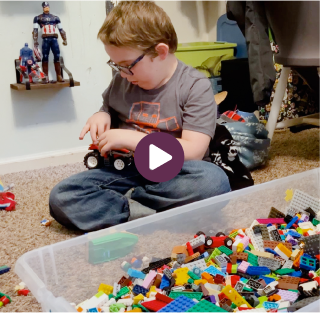
Olivia shares her journey as a parent
to Adalissa and Solomon,
who live with a rare genetic disease of obesity
OLIVIA
I’ve had so many people who have met Adalissa tell me, you know, she just brightens a room when she comes in here. And she’s always in a good mood. She never has anything negative to say.
And Solomon he is an absolute joy. He just makes you smile every single day because you really, you never know what this kid is going to say or do.
I have four children, their ages are 17, 15, 14 and eight. Adalissa and Solomon, my oldest and youngest, they have BBS.
We knew that something was wrong with Adalissa but we just kept going to doctors, nephrologists, her eye doctor, urologist, we couldn’t find anybody that was able to help us.
Finally, when she was seven years old, we found a genetic center that was able to finally give us a diagnosis.
Initially when we got the diagnosis for Adalissa, it was relief and it was also followed with some heartbreak; just knowing that, you know, there’s nothing I can do to make her well really is just treat the symptoms but this is a lifetime condition that she has to live with.
After I had Adalissa we had the two middle boys that are 15 and 14 now, they didn’t have any symptoms. When Solomon was born, we had the prenatal scans as well and they saw an extra finger and some kidney issues on the scans. So we knew before he was even born, that he had Bardet-Biedl Syndrome as well.
There’s so many different symptoms and issues when it comes to Adalissa and Solomon and BBS. But for both of them, right now, a big priority for us is dealing with the hyperphagia. It’s the constant hunger.
With BBS, they feel like they’re in a famine. And so they have to conserve all that energy that they can, because they’re not sure if they’re going to get another meal. That’s how their brain works. They know that they just ate, but at the same time, they have this feeling that, “Oh, this is going to be my last meal.”
We’re always telling Solomon when he comes in, after he’s done with dinner, he’ll say, you know, “My belly is hungry.” And I’ll just tell him, “You know, your belly is lying to you, son. Like, you just had dinner and you are fine.” It’s what we’ve got to do just to get at his level and help him to understand that you’re really not as hungry as you think you are.
We were offered an opportunity to attend a Bardet-Biedl Syndrome Family Association Conference, and meeting those people there and finding out, “Oh, hey, there’s a Facebook page that you can go to, and join. And just having these relationships with other parents who have been through what I’ve been through, it just opened up doors and friendships.
They’re not limited. I mean, I allow my kids to do and encourage them to do whatever they want to do out. Adalissa, for instance, has done pageants since she was about six or seven years old. And she absolutely loves it. She just wants to have fun. It’s not about if she wins, if she loses, it’s all about fun for her and doing what she loves, which I just encourage her to continue to do.
I would tell parents of a newly diagnosed child to not panic. Just to breathe and just to know that it’s not the end of the world. These kids, they’re a blessing. They’ve blessed my life and several other lives around them. Get the help that you need, that’s offered to you. And, you know, just look for the support systems that are out there.
LEADforRareObesity.com
facebook.com/LEADforRareObesity
Rhythm, LEAD for Rare Obesity, and their logos are trademarks of Rhythm Pharmaceuticals, Inc.
©2021 Rhythm Pharmaceuticals, Inc. All rights reserved. US-NP-2100212 December 2021
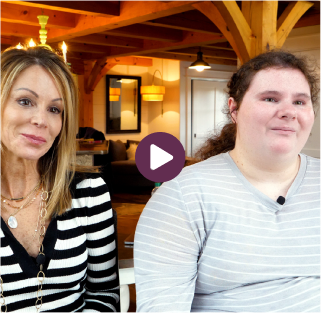
Leigh and her daughter Izzy
who lives with a rare genetic disease of obesity, share their story
IZZY
I would say my weight is my biggest challenge, and it affects every aspect of my daily activities.
LEIGH
It is really something that touches, it’s the cornerstone of her existence. It touches every part of her life that you can think of. Izzy has fatty liver disease that gets worse and worse the more weight that she gains, and she understands that. But it’s almost like an infinity symbol. It’s not even circular, because it is the most prevalent issue in Izzy’s life and in our family’s life.
LEIGH
It took five years until we actually had a diagnosis for her, for BBS, for her genetic condition. And I’ll tell you it was a very rough five years. We switched pediatricians probably 10 times. Izzy was referred to as having ‘Izzy syndrome’ because she had all of these different scattered symptoms, but nobody knew to put them all together. And as a mom you’re hoping you’re going to get a diagnosis, and everything’s going to be okay, we’re going to figure everything out. Well, when we finally got the diagnosis, it didn’t really do anything for us.
IZZY
It’s different for everyone, but for me it’s when I’m hungry I can’t stop it, cause I don’t have the signal from my brain, stomach to my brain that I’m full.
LEIGH
I always say I have three of the greatest humans that I know, and I’m extremely proud of them. Yeah, I’ll be very honest about it, it wasn’t the Hallmark ad with the kids holding their sibling in their lap and helping them and really embracing them. There was a lot of resentment there when they were growing up, because the world really did revolve around Izzy.
LEIGH
There’s all this talk in society about being heavy and losing weight, and it’s not something that’s understood. So she’s immediately discriminated against because of that. Because nobody’s going to believe, well I can’t control it. Well of course you can control it, you can control what you want to control. That’s not the case.
IZZY
When I was little I would like look at all these magazines of people, see people on TV and like, why can’t I be that…like people who are skinny, like, well why can’t I ever be like that? Like I’ll never be like that.
LEIGH
I know it’s a very sensitive subject for her. And she’s beautiful. And what do I always tell you? That you don’t need to look a certain way. You’re beautiful, you just need to feel a certain way. I wouldn’t push Izzy to do things that were discouraging and that she could not succeed at, but I raised Izzy saying you can do whatever it is that you want to do, and you need to set your mind to it.
LEIGH
I have always been a huge advocate for Izzy. I have a reputation that I don’t know if it’s good or bad, but when I’m advocating for something whether it be services or a new computer, whatever it may be for Isabelle, there’s really almost a tension in the air that is don’t mess with her, she’s not going to give up. Cause I love her so much.
IZZY
And I love you so much.
LEIGH
I know.
IZZY
I know.
LEADforRareObesity.com
facebook.com/LEADforRareObesity
Rhythm, LEAD for Rare Obesity, and their logos are trademarks of Rhythm Pharmaceuticals, Inc.
©2021 Rhythm Pharmaceuticals, Inc. All rights reserved. US-NP-2100210 12/2021
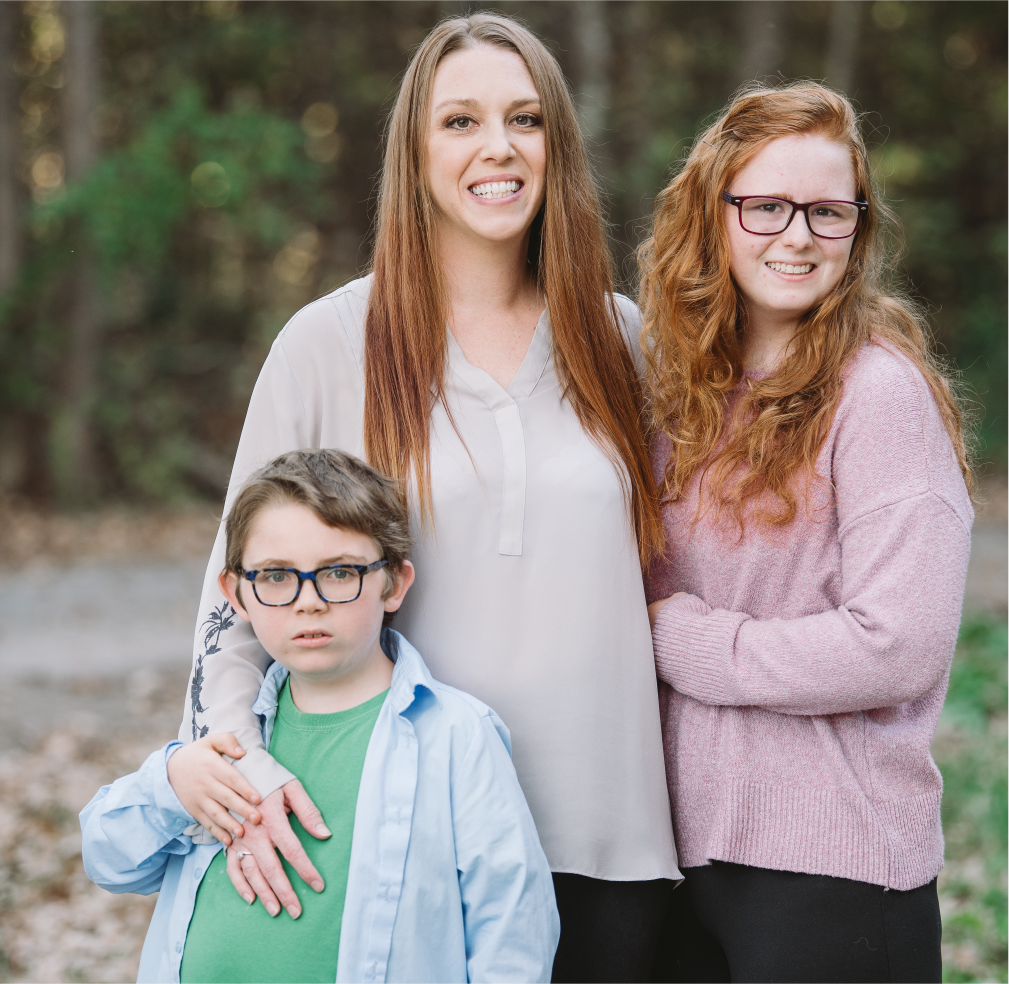
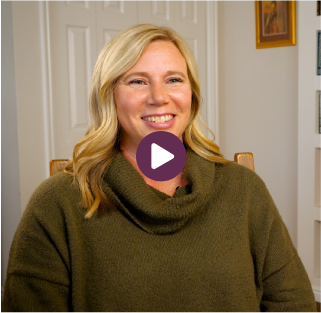
Amy and her son Alex share their insights as the mother and brother to Lauren and Tyler, who live with a rare genetic disease of obesity
AMY
I have four children, two boys, two girls. We tend to be busy every evening with some kind of activity. But what really adds some difficulty to our lives, is that two of the children have special needs. They have a rare syndrome called BBS.
AMY
My children were both born with extra fingers and toes. And we knew that that was possibly just a birth defect. But because they had rapid weight gain, and they had cognitive delays, and developmental delays and just a variety of things, we were always searching for something. We knew that there was something going on with them.
AMY
Tyler was bottle fed as a baby. And so I would fix him a bottle and he would drink the whole thing. And then he would continue to act like he was hungry. And I was a new mother, I didn’t know. I just assumed if he acted hungry, then he was hungry. So I would fix a new bottle. And there were times where he would drink that second one and then he would end up throwing it up. Just the whole thing. I knew he was full, but he still acted hungry. And I didn’t understand why.
AMY
When Tyler was about nine years old, I had gone to a women’s conference. Had nothing to do with special needs, or looking for a diagnosis in any way, just a fun weekend retreat. And one of the speakers there was talking about her daughter and showing pictures of her. And I was struck by how similar she looked to Lauren, my youngest with BBS. And then she mentioned that her daughter was born with an extra toe. When this conference was over, I went home and looked up the blog of the speaker and found information about Bardet-Biedl syndrome.
AMY
When we finally received a BBS diagnosis, I felt so much gratitude after so many years of searching, but then I also felt grief and distressed that there was really nothing we could do to help Tyler and Lauren. We really were managing symptoms.
AMY
Having two kids with BBS in our family, as well as two kids without, who are typical, has posed some challenges for our family. But on the bright side, it has really created compassion and empathy in my kids who are not affected with BBS.
ALEX
One of the blessings about having siblings with BBS is that you really get a sense of kids that are struggling and the emotions and the tendencies that come with that. And it makes you a lot more aware and just kindhearted.
AMY
Today, both Tyler and Lauren are struggling with their weight. They are both struggling with vision loss. They’re struggling with loneliness because they struggle to make friends and to fit in with peers their age.
AMY
Because of Lauren’s intense hunger and weight gain, it affects her friendships in that she’s not able to keep up with other kids in physical activity. She’s also quite aware that her body doesn’t look the same as her friends’, and that bothers her at this point in her life. And the other girls her age are noticing also, and 13 years old is a difficult age for girls to kind of navigate those friendships.
ALEX
I think, with kids my siblings age, especially Tyler and Lauren, it’s hard to understand why they’re different. And if I had to say one thing to the peers around them is just take your time, get to know them. They’re the sweetest souls with the kindest hearts. And they’re just like anyone else, they just take an extra second to fully catch up, and that you can still have great conversations with them and still form genuine connections with them. It just takes a little bit more effort and it’s worth it.
AMY
What I would want parents of a BBS child to know is that it is natural to want to search out every solution, every treatment, every possibility, to try to fix your child or to improve their lives. And that’s good, but there will come a time where you just hit a wall and you get a little burned out and you can’t continue to keep moving at that pace. And that it’s okay to slow down. It’s okay to find a comfortable pace to move at that you can sustain because this is a lifelong journey with BBS.
LEADforRareObesity.com
facebook.com/LEADforRareObesity
Rhythm, LEAD for Rare Obesity, and their logos are trademarks of Rhythm Pharmaceuticals, Inc.
©2021 Rhythm Pharmaceuticals, Inc. All rights reserved. US-NP-2100211 November 2021
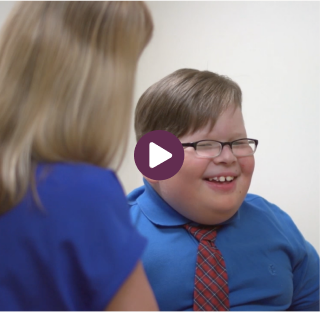
It’s not your fault. It’s genetic.
I think it’s important to know that the obesity is due to a genetic cause, simply because it can sort of assuage some of the guilt that the parents have about the child’s weight.
I think that once they have a name for what is causing this, then they can say to themselves, “Okay, see, I didn’t really do this. This isn’t my fault.”
VOICES of Rare Obesity
Rhythm, LEAD for Rare Obesity, and their logos are trademarks of Rhythm Pharmaceuticals, Inc.
© 2020, Rhythm Pharmaceuticals, Inc. All rights reserved. GL-NP-2000033 08/2020.
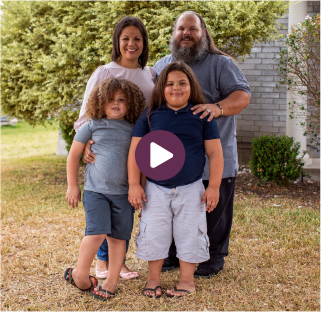
Denise and Evan share the story of their sons, Drake and Everett, both living with a rare genetic disorder of obesity
Drake (left) and Everett (right)
It wasn’t until really about two and a half, three years old that we noticed that Drake was becoming bigger than the kids his age.
Denise
Mom to Drake and Everett
He literally could run around for days and expel calorie after calorie, but with the amount of energy he was putting out, he wasn’t losing any weight.
I think Drake went through probably 12 diets at the age of three years old. It got to the point where, no matter what we were doing, he kept gaining weight.
We just simply thought we were feeding him too much or we were feeding him the wrong things. And it isn’t until more recently that Everett has started to exhibit some of these symptoms that Drake did.
There are two key symptoms of rare genetic disorders of obesity
Early-onset obesity and insatiable hunger
Hunger in our house is constant. It is always there. Our boys are always hungry.
Drake wakes up hungry, and pretty much the first thing out of his mouth is what’s going to be for breakfast.
When you have a child who can eat an adult-sized meal and tell you that he’s still hungry at the end of it, and he’s eight years old, it’s hard to deal with sometimes.
It’s extremely hard to watch your kid in tears telling you, “No, but I’m really so hungry,” and you have to tell them, “No. No, I’m sorry. You can’t. You can’t eat right now.”
It’s heartbreaking because you don’t know how to fix the problem. And as a mom, you want to heal their hurts. And you can’t always do that when you don’t have an answer to what’s going on.
Searching for answers, Denise and Evan consulted their sons’ doctor
So we had spoken with the pediatrician, and she sent us to an amazing endocrinologist. The first thing he did was the blood work.
After the genetic testing, Drake was diagnosed with a rare genetic disorder of obesity. Later, the family was tested and younger brother, Everett and mom, Denise were diagnosed with the same disorder.
I felt a lot of stress relief in, in the sense that at least I knew now what he was going through.
Raising children with a rare genetic disorder of obesity
I think a lot of people think that because our kids are bigger, that we’re bad parents. I think that if they saw the strain and the stresses that we have to put on our boys, they would see that this is not an easy thing to go through.
I have to be aware of what they’re doing, what they’re eating, and make sure that they’re not going overboard.
Evan
Dad to Drake and Everett
I think their hunger affects how they learn and how they’re being taught because it’s constantly in their minds.
You can be so disappointed because you have this condition that you don’t want to do anything. And I don’t want my kids to live their life that way.
I think they realize in their own way that even though they are a different size, that they are still capable.
When Drake became a black belt in taekwondo, I think it really did a lot for his self-esteem. I remember hugging him as he cried and said, ‘I did it, daddy.’”
For the future for my boys, I hope that they grow up happy, and knowing that they’re loved, and I hope that they are able to accomplish all that they have in their mind for their life.
If you suspect that you or someone you know might have a rare genetic disorder of obesity, talk to a doctor
LEAD for Rare Obesity logo
www.LEADforRareObesity.com
facebook.com/LEADforRareObesity
Rhythm, LEAD for Rare Obesity, and their logos are trademarks of Rhythm Pharmaceuticals, Inc.
© 2020, Rhythm Pharmaceuticals, Inc. All rights reserved. GL-NP-2000003
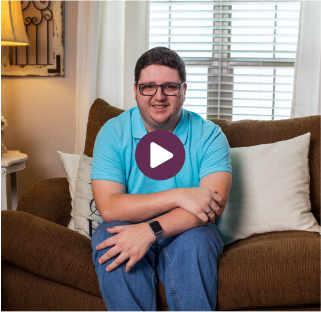
A Journey to BBS Diagnosis
LEAD logo
Donna, Paul, and Tanner share the journey to Tanner’s diagnosis of Bardet-Biedl syndrome (BBS), a rare genetic disorder of obesity.
Donna
Mom to Tanner
It was a totally normal birth. But when he was born, the doctor came over and said, “Well we do have a couple of issues, one of his feet are curved in and he’s got extra digits.”
They did some blood work, and everything was fine. So, they sent us home and slowly things started to change.
At three months old, Tanner was admitted to the hospital after experiencing ongoing pain.
Over the next few months, Tanner had multiple surgeries to fix life-threatening intestinal issues caused by Hirschsprung’s disease. Then he started to recover, but other concerns began to arise.
Paul
Dad to Tanner
And then he started gaining weight. So, he had doubled his weight in two months.
He kept gaining and gaining, and it didn’t make sense because we were feeding him the recommended amounts. Which is what sent us into our next area of concern, which was, why is this happening? This isn’t normal.
We talked to probably three different nutritionists…each one of them would say, he’s doing fine.
There was one point where we had to lock the pantry door just to keep temptation out of the way.
As Tanner continued to gain weight and experience feelings of intense hunger, Donna and Paul turned to a specialist for answers.
His doctor decided he needed to see a geneticist. We talked for a long time and he came back with a sheet of paper that he had photocopied from the back of one of his old medical textbooks, and said, well, I don’t think he has this. But it’s the only thing I can even remember or think of that could even remotely relate to his anomalies. If all the pieces start fitting together over the years, it’s probably what he’s got.
And it was Bardet-Biedl; that was the paper that he had photocopied for us.
Over the next several years, Tanner’s eyesight began to deteriorate, which led Donna and Paul to increase their suspicions of BBS.
Then we started doing more research into the type of blindness that’s associated with Bardet-Biedl and its retinitis pigmentosa. You only have central vision; all your peripheral vision goes away.
We decided to go ahead and get him officially tested. He did have retinitis pigmentosa, it was pretty severe at that point.
As Donna and Paul uncovered more pieces to the puzzle, they believed Tanner was indeed living with BBS. Tanner received a genetically confirmed diagnosis years later in adulthood.
Despite some hurdles along the way, Tanner now lives independently at college.
We were very nervous when he went off to college. But he’s never missed a beat being away from home.
Tanner marches in the college band, he does the marching like everybody else does.
Tanner
Living with BBS
I play multiple instruments. I actually taught myself how to play guitar and bass about seven or eight years ago. And I’ve been playing the saxophone since middle school.
I’m studying computer science. I want to try to find a job that I love and that I hope to do for a long time.
Everybody calls him in an inspiration because this is not something that’s ever gotten him down.
We are so proud of him.
Even though I have this syndrome, there’s nothing that’s going to hold me back from what I want to do.
While these were the symptoms Tanner experienced, the signs and symptoms of BBS can vary greatly from person to person.
To learn more about rare genetic disorders of obesity, including BBS, visit:
LEADforRareObesity.com
facebook.com/LEADforRareObesity
Lead for Rare Obesity logo
Rhythm, LEAD for Rare Obesity, and their logos are trademarks of Rhythm Pharmaceuticals, Inc.
© 2020, Rhythm Pharmaceuticals, Inc. All rights reserved. GL-NP-2000038 11/2020
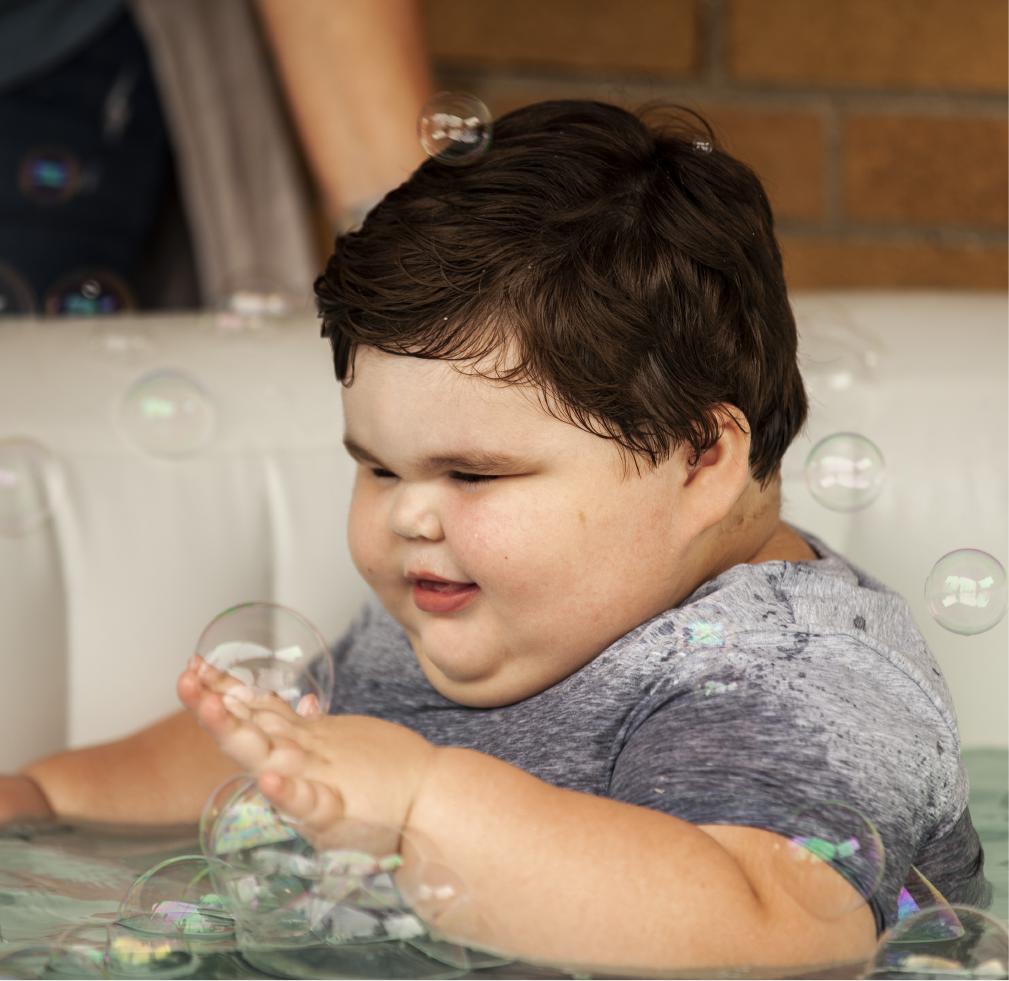
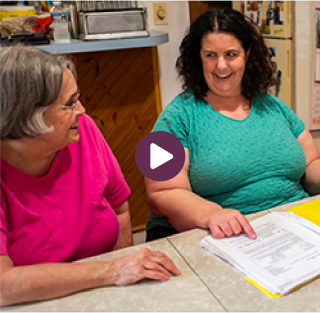
Insights from 3 families living with symptoms that may be related to rare genetic disorders of obesity
Hunger is a main part of our life.
SYMPTOM 1: Insatiable hunger
And it is always on Nate’s mind. It controls him. And hunger is right beside him. I want to say his best friend, but it’s not; it’s his mortal enemy. Hunger is his mortal enemy.
KAREN
Mom to Nate, living with POMC deficiency, a rare genetic disorder of obesity
People think that I’m making it up sometimes, and I wish that they could get inside my body and that they could feel the physical sensations of hunger so that they would fully get how hungry I feel.
BECKY
Living with a suspected rare genetic disorder of obesity
SYMPTOM 2: Weight gain despite a restricted diet and exercise
I think there is such a stigma on obesity and it’s directly correlating with, “They must eat too much. They must sit around too much.” With individuals with these disorders, that’s just not the case. No matter how much we cut their calorie intake, no matter how much they exercise, they’re going to either continue being large or they’re going to continue gaining weight.
MOLLY
Mom to Joshua, living with a suspected rare genetic disorder of obesity
I’m gaining all this weight from what’s considered a normal amount of calories; that’s a definite sign that something’s drastically wrong and that it’s a disease state.
SYMPTOM 3: Severe obesity that starts early in life
Between the ages of 4 and 6 months, he had gained about 6 pounds. On average he had gained about a pound every week thereafter. He is the average height of a 6 year old.
And so I did a food log to see how much, and I’m like, “but this is what any child at 1 1/2 would eat.” And he was gaining 3 pounds a week.
It’s a hard job, so I had to focus on the good.
You can take steps to seek more answers about rare genetic disorders of obesity
Talk to a doctor if you or someone you know shows symptoms of rare genetic disorders of obesity
LEAD for Rare Obesity logo
www.LEADforRareObesity.com
facebook.com/LEADforRareObesity
© 2018 Rhythm Pharmaceuticals. All rights reserved. MC4R-C0087 December 2018.

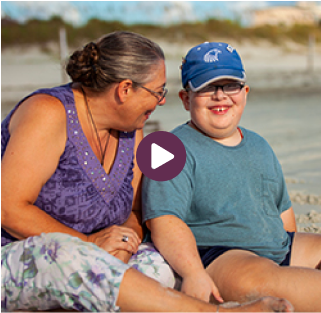
Coping Through the Diagnostic Journey: Karen and Nate’s Story
As soon as you meet him, your face will light up. That’s who he is. Somebody once said that he was joy personified.
Nate has POMC deficiency, which is a rare genetic disorder of obesity.
KAREN Mom to Nate, living with POMC deficiency, a rare genetic disorder of obesity
His hunger started at 1 week. He cried of hunger.
Karen: “You had dinner.”
It hurt him, and as a parent I couldn’t do anything. I couldn’t fix it.
I remember he was 5, and in 1 day, every 5 minutes, he asked for food, or referenced food, or went to the kitchen to find food. Every 5 minutes of the day.
Finding the diagnosis was a matter of me going to the doctor and saying, “There’s something wrong with my child. Look at his weight, look at his sleeping habits, look at this and this and this—I think there’s something wrong.”
The doctor walked into the room; he said, “It’s genetics, not anything you’ve done; it’s not what you fed him.”
Dealing with that information afterwards, that was difficult, because that was when I was dropped on my island. That was when I was swimming in the dark, not knowing what to do.
Social media is my lifeline. I can help people, and I can get helped in return. I talk about the bad days and the good days.
If you suspect that you or someone you know might have a rare genetic disorder of obesity, follow your instincts and talk to a doctor
I would say, go with your gut feelings. Keep going until you get the answers. You are the parent. You’re the mom, you’re the dad, whatever. You know—you know there’s something. You can feel it. You can see it. You’re with your child. Push. I’m there for them, and I hope they find answers.
Rhythm is working every day to advance the understanding of rare genetic disorders of obesity and to improve the lives of those affected
LEAD for Rare Obesity logo
www.LEADforRareObesity.com
facebook.com/LEADforRareObesity
© 2018 Rhythm Pharmaceuticals. All rights reserved. MC4R-C0089 December 2018.
“The best two pieces of advice that I have ever received and will give are: Trust your instincts, and don’t be scared to speak up.”
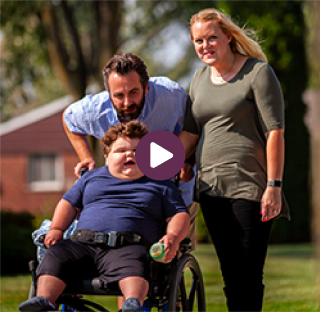
Searching for Answers: Molly and Joshua’s Story
Joshua is 3 years old but is the height of a 6 year old and the weight of maybe a 9-10 year old.
Joshua was born a normal weight but he continued gaining weight right from the start. He gained 6 pounds between a 4- and a 6-month checkup and gained about a pound a week thereafter.
MOLLY
Mom of Joshua, living with a suspected rare genetic disorder of obesity
So I started keeping food logs and said, “This is how many calories he’s consuming. Would this amount justify this amount of weight gain that we’re seeing?” And I ended up hearing no.
He’s physically going over to the cabinet and requesting that snack or requesting the bottle or requesting another food item, and that’s happening continually through the day. So we believe that he is just continually feeling hungry.
So then we went into “Who can find answers for us?” mode.
Instinctually you know; we had continued going to the doctors and explaining that something’s just not quite right or different with Joshua than our other 2 children, and we got a lot of fussy baby syndrome, colicky baby syndrome. But that fussiness continued, and that instinct remained in my husband and I that something’s different and he is growing at a rapid rate.
Joshua’s doctors suggested genetic testing
Every time we revisit a doctor or go to a new doctor and hear “We without a doubt believe Joshua has a rare genetic disorder of obesity,” it’s validating, and it reminds us that it’s not our fault. We didn’t do anything to cause this.
The best 2 pieces of advice that I have ever received and will give are number 1: trust your instincts, and 2: don’t be scared to speak up. You are your child’s voice. You know your child best, and you are the one that’s going to step forward and make those choices and make those changes for them.
Rhythm is dedicated to shedding light on rare genetic disorders of obesity
If you suspect that you or someone you know might have a rare genetic disorder of obesity, follow your instincts and talk to a doctor
LEAD for Rare Obesity logo
www.LEADforRareObesity.com
facebook.com/LEADforRareObesity
© 2018 Rhythm Pharmaceuticals. All rights reserved. MC4R-C0088 December 2018.
Taking the LEAD. Share your story.
If you would like to share your experience with a rare genetic disease of obesity or a helpful tip, we’d love to hear from you. You can email us at [email protected] or ask us to call you.
If you would like to share your experience with a rare genetic disease of obesity or a helpful tip, we’d love to hear from you. You can email us at [email protected] or ask us to call you.
If you would like to share your experience with a rare genetic disease of obesity or a helpful tip, we’d love to hear from you. You can email us at [email protected] or ask us to call you.

A private community
We invite you to join LEAD for Rare Obesity’s private Facebook community, a place to connect with others, share experiences, and ask questions. This is a closed group only open for individuals, friends, and family affected by rare genetic diseases of obesity.

